- Home
- Heather Hildenbrand
A Risk Worth Taking
A Risk Worth Taking Read online
Copyright ©2013
Heather Hildenbrand
A Risk Worth Taking
A Risk Worth Taking is a work of fiction. Names, characters, places and incidents are either the product of the author’s imagination or are use fictitiously. Any resemblance to actual persons, living or dead, events, business establishments or locales is entirely coincidental.
No part of this sample may be reproduced, scanned or distributed in any printed or electronic form without permission. All rights reserved.
Cover by Emily Mah Tippets
Editing by Kristina Circelli
Here’s to choosing.
Here’s to being chosen.
Chapter One
Chapter Two
Chapter Three
Chapter Four
Chapter Five
Chapter Six
Chapter Seven
Chapter Eight
Chapter Nine
Chapter Ten
Chapter Eleven
Chapter Twelve
Chapter Thirteen
Chapter Fourteen
Chapter Fifteen
Chapter Sixteen
Chapter Seventeen
Chapter Eighteen
Chapter Nineteen
Chapter Twenty
Chapter Twenty-One
Chapter Twenty-Two
Chapter Twenty-Three
Chapter Twenty-Four
Chapter Twenty-Five
Chapter Twenty-Six
Chapter Twenty-Seven
Chapter Twenty-Eight
Chapter Twenty-Nine
Chapter Thirty
Chapter Thirty-One
Chapter Thirty-Two
Chapter Thirty-Three
Chapter Thirty-Four
Chapter Thirty-Five
Epilogue
About the Author
Chapter One
Summer
“What you seek is seeking you.” –Rumi
I looked around my bedroom at the growing pile of cardboard boxes and sighed. There was something seriously depressing about moving home again, regardless of the fact that it’d been voluntary. I picked up a box, calculating open space, and set it down again. My college dorm room had been roughly the same size. How had I accumulated more items than the space allowed between there and home?
My room was exactly as I’d left it almost four years earlier. Right down to the purple-and-charcoal bedspread with curtains to match. Dad hadn’t made a single change while I’d been away. Not in my room, not in the rest of the house, and from what I’d seen, not with his business either. The only change he’d made hadn’t been his choice. She’d made all the changes for him. And she hadn’t looked back.
But that’s why I was here. To pick up the pieces she’d left behind.
The furniture was a dark oak with neutral accents, but instead of making the room feel depressing and drab, the muted colors were soothing, like sitting underneath a giant shade tree. Being in this room had always been the one place in the house I could escape.
Living at Heritage Plantation came with a certain level of chaos. There was always a body in the house, whether family or staff or someone we considered both; the noise and bustle was constant—all part of the territory when you lived under the same roof that you worked. Well, the business end of things was under this roof. The office, now mine, was downstairs off the kitchen, an add-on my dad had given the place when the farm really got rolling several years back. The rest—the hay and cornfields, the greenhouses, the tractors—had their own space. And lots of it. Heritage Plantation was big enough to get lost in and still never leave “home.” I loved that.
Still, when the crowd became too much, my room was my solitude. My peace and quiet. I was hoping for that same feeling now that I’d come back again. But things were so different, I wasn’t sure there was any place that could make me feel that way. Dark thoughts crept in before I could stop them, my eyes pricking with quick tears. I hated that the thought of her, of what she’d done, still shook me like this.
The sound of boots on the stairs startled me out of my thoughts. I pretended to survey the boxes as I blinked away the moisture. A pair of weathered hands appeared, wrapped around a large box. My dad’s narrow-brimmed cowboy hat bobbed up and down behind the cardboard, his face obscured by the load he carried. He grunted as he set the box at my feet—somehow finding space in the middle of the mess—and then straightened. His back popped as he arched it in an exaggerated stretch.
“You okay?” I asked, raising an eyebrow.
“I am now. That was the last one. Finally.”
“Thanks for helping me carry all of it up.”
He snorted. “Next time we’ll get a crane. Whaddya have in these bags? Bricks?”
“Close,” I admitted. “I brought a lot of books home.”
He grunted something unintelligible but didn’t complain further. We both knew what I’d given up in coming home. I’d had plans for a Master’s, a career in the city. The farm had always been my parents’ thing, not mine. He’d tried and tried to talk me into staying, to pursue my dreams. But how could I follow a dream born from a life built on a lie?
“I’ve gotta get back to work. I’ll see you for dinner?” he asked.
“Wouldn’t miss it, Pop. Thanks,” I told him, planting a kiss on his cheek and following him to the top of the stairs. His boots made a clop-clop sound as he trudged downward. The sound was a familiar one. I’d been listening to it from my bedroom doorway my whole life. It was comforting, steadfast in a way other things weren’t. Not anymore.
For the millionth time since walking in the door, I thought of my mother and a pang shot through my gut. A cross between nausea and heartache. Even after six months to digest it, my mom’s decision to leave, to divorce my father, still seemed surreal—especially now that I was home.
I examined the foyer from my perch at the top of the stairs. It wasn’t so much what was here as what was missing. Little things. Figurines, cross-stitched pictures in frames, coffee table books. The absence of fresh flowers on the side table. And even though it hurt like a fresh cut, I’d said nothing as I’d followed Dad through the house and upstairs. If it was this painful for me, I could only imagine what it did to him every time he walked by.
I yanked on the tie holding my hair back and let it shake free. Thick brown waves with honey highlights spilled over my shoulders. I ran absent fingers through the ends, brushing out the tangles that seemed to form the moment I moved my neck in the mornings. I was forever combing tangles—a trait that had skipped a generation if my mom’s perfectly groomed twists were any indication. Although, I couldn’t complain too much; thanks to her Brazilian heritage, I could eat and eat without gaining an ounce. Something I was grateful for when the other girls at college had been too obsessed with their figure to enjoy a good dinner. Sorry for your luck. This girl was eating her entire cheeseburger. And fries.
My phone beeped inside my pocket. I pulled it out, examined the screen, and bit back a grimace. I’d avoided this long enough. Now, standing in the privacy of my own room, I decided I’d better get it over with.
“Hello?” I said, struggling to keep the resignation out of my tone.
“Summer?” The familiar voice on the other end was a mixture of both worry and relief.
“What is it, Aaron?”
“I’ve been calling you for days.”
“I know. I just—there wasn’t anything left to say.”
He paused. I wasn’t sure if it was because he knew I was right or hadn’t really expected me to answer the phone in the first place. “So nothing has changed then?” he asked quietly. “You still want this … us to be over?”
I knew his words, the very sound of his
voice, should tug at me, make me feel something. Aaron and I had been together two years, after all. But I felt nothing. That, in itself, was my biggest clue I’d done the right thing in breaking things off before graduation.
“Nothing’s changed,” I confirmed.
Aaron was silent. I pictured him squeezing his eyes shut, trying to find the right words. But there weren’t any. None that would make me change my mind, anyway. I needed to make him see that without hurting him in the process. Well, more than I already had.
“You and I were good together, Summer,” Aaron said. “We got along, never fought, we had fun. I was happy with you. I thought you were happy with me too.”
“I was … sort of.” How in the world could I explain it to him when I couldn’t fully make sense of it myself? “This thing with my parents has made me think.”
“Think about what?”
I tried to keep the frustration out of my voice, but it crept in. Just like it did any time I tried explaining to someone exactly what the divorce had done to me. No one ever got it. My friends at school had worn blank looks, my dad didn’t seem to want to talk about it. I’d avoided anyone else who might ask just so I wouldn’t have to face the strange looks when I tried to make them understand. “I don’t want to ‘get along’ or ‘have fun,’ Aaron,” I said. “I want to live. I want to feel it. I want it to matter.”
“I thought I did matter.”
“I …” I’d already said it once and that had been hard enough. Why was he making me say it again? I squeezed my eyes shut and whispered, “I just need to go my own way.”
Heavy silence hung on the line.
“If it’s space you want, I’ll give it to you,” he said, his words clipped. “Enjoy the wide open. But Summer?”
“Yes?”
“I’m not your mother.”
“I know that,” I said. Then I hung up.
I took my time unpacking, carefully choosing what to store and what to keep out. Space was limited, but I didn’t mind. I needed the dilemma the shortage of space provided—it distracted me from problems that had no easy answers. Like Aaron. And my mother.
I knew Aaron was working through disbelief and heading for anger. And he had a right. We’d had no real issues, no obstacles that would raise a red flag in the relationship. He was nice. Took me on dinner dates. Remembered birthdays. He laughed at my jokes. Listened—mostly—to my rants about the literary research papers I had to write, and about my professor with a crooked nose and nasally voice that you couldn’t hear unless you sat in the front row. Aaron was patient, always understanding when I couldn’t see him because of a test to study for. He was predictable. Steady. Calm.
I’d actually liked those things about him at one point. Even the predictability. It meant something you could count on. Both were things I wanted in a boyfriend. Both were things I’d seen in my own parents’ relationship. Until I’d come home for winter break and my parents had said they were separating. Not a trial basis, but the first step toward the d-word. Papers were filed. My mother had already moved out. Gotten a little apartment in the city. And from the way my mom had smiled when she’d said it, I knew it was really over. It grated on me—that smile, that happiness.
It made me furious.
If the two people who seemed the most stable in the entire world couldn’t make it last, what chance did I have?
I’d gone back to my last semester of school without an answer. Aaron had complained that I was distant, but when I brushed him off, he let it go. That was his way. And I’d realized it wasn’t enough. I wanted more. A connection so tight the other person couldn’t possibly ignore the other’s hurt. Or distance. Or pulling away. Did that exist? I thought it did, but after seeing my parents split, maybe it didn’t. Maybe it was all a fairy tale.
In my mind, it wasn’t worth finding out. The hurt I saw in my father was all too real.
The day I’d graduated, I broke it off with Aaron and told my dad I was coming home, business degree in tow. I would pick up the slack Mom had left behind, do the books for Heritage Plantation—her job up until six months ago. And maybe figure out what it was I wanted in the process. The big city—the rest of my life—could wait.
Heat from the kitchen drifted through the hardwood, warming my feet and signaling me for dinner. I always knew when a meal was being cooked. This floor conducted heat like a metal rod in a thunderstorm. I gave up on unpacking the latest box of books onto an already full bookshelf and headed for the kitchen. The scent of hot food made my stomach rumble.
I rounded the staircase, nearing the bottom when I heard boots stomping against the welcome mat below me.
“Uncle Frank,” I called, zipping down the last few steps and launching myself at him.
Frank grunted but held firm. Years of manual labor had taken its toll on his aging body, and I knew there was muscle hidden behind all that flannel. “Goodness, girl, what do they feed you up at that big fancy school? You must’ve gained a ton.”
“Either that or I’m not six anymore.” I laughed and pulled back so I could look up at him. His leathery cheeks had a few more fine lines, but otherwise, he looked the same. The sight of him was familiar and comforting, and though he wasn’t blood related, he’d been my dad’s best friend and surrogate family for so long, no one remembered we weren’t related.
He squinted at me. “Coulda’ fooled an old man. Every time I look at ya I still see a gap-toothed smile.”
I punched him lightly as my attention was drawn to the sight of another familiar face coming through the front door. His cheeks were scruffier than the last time I’d seen him. His hair was longer, too.
“Hey, sis,” he said, grinning at me as the storm door slammed shut behind him.
“Casey,” I squealed, launching myself at him even harder than I’d done with Frank. I wanted to knock this one off balance, just for bragging rights. But Casey caught me easily and swung me up, lifting my feet off the ground and spinning a full circle. By the time he set me down again, it was half-hug, half-wrestling match and we were both laughing.
“Glad you’re back. Been way too quiet around here without you,” Casey said, finally letting me go and straightening his shirt.
Pots banged together in the kitchen and someone—a male—let out a string of curses followed quickly by an apology. I gave an exaggerated eye roll. “You were saying?”
Casey grinned. “Guess Mazie’s getting the newbies to do the dishes again.”
“Must mean food’s almost ready,” Frank said, rubbing his hands together and setting off toward the kitchen.
Before I could move to follow, Casey reached out and wound his arm around my neck, pulling my cheek against his collarbone. But I was too familiar with Casey’s tricks to be caught. I ducked out before he could yank me close enough to press his knuckles to my scalp.
“You get faster up there in the big city?” he asked.
“Or you got slower living down here in the country,” I shot back.
“You two are relentless,” Frank said.
“Not our fault,” Casey protested.
“How do you figure?” Frank asked.
“The way I see it, if you and Dean hadn’t stuck us together since we were in diapers, we might’ve been able to curb the sibling rivalry long enough to be nice to each other.”
“So it’s my fault, then?” Frank demanded.
I stifled a smile. It was an old argument between them—one that both men seemed to enjoy since neither ever got legitimately mad at the other over it.
Frank went on, his voice rising, “I should’ve let you be raised by strangers instead of your own uncle? Your own flesh and blood?”
“Of course it’s your fault, Frank,” Casey said, the details too long gone for him to be ruffled by the reference to his parents’ accident. “But I wouldn’t have it any other way. You and Summer and the rest—you’re my family.” He punched the older man lightly on the arm and Frank scowled, but I saw the expression smoothing into something l
ike affection as Frank turned away.
I exhaled, some of the tension inside me melting off at being surrounded by people I loved. They might not be blood, but Frank was the only uncle I’d ever known, Casey more like a brother. I wouldn’t trade them for anyone.
As I stepped through the doorway, my eyes fell on the empty seat at the far end of the table. The one right next to my dad’s usual spot. A sharp pang shot through my gut but I shook it off. I wouldn’t think of her now. Not with all the hustle and bustle and familiar faces waiting. I could think of it in the quietness of my bed tonight—and every night after if needed.
“Summer!” Mazie, our housekeeper, pushed past the others crowding the kitchen and hurried forward, holding her arms out. I stepped into the circle of her arms and inhaled the scent of garlic and dish soap that was Mazie Pagonis.
The older woman squeezed tight and then quickly pulled away with a frown. “You’ve lost weight, Paidi mou,” she said, her Greek accent faded after so many years on Virginia soil.
I smiled. Paidi mou, in Greek, meant ‘my child.’ It had been Mazie’s pet name for me since I was little. “I’m fine,” I assured her.
Mazie clucked her tongue, going on as if I hadn’t spoken. “You’re wasting away. Good thing I made pasta tonight. It will stick to your insides. Casey!”
Behind her, Casey jumped. “What?”
“Carry the bread rolls to the table.” Casey moved toward the counter but Mazie stopped him with a reproachful look. “Wash your hands first.”
“Yes, ma’am.” Casey switched directions, heading for the sink.
“It smells delicious,” I told her.
“Good. I expect you to eat like it,” she said.
Mazie hurried away, rattling off instructions to the nearest body to help her with the heavy lifting. Pans and platters were lifted from the oven by willing arms, all belonging to hungry crew unlucky enough to have arrived early for the meal. Mazie didn’t believe in idle hands.
Dean Stafford employed only one year-round, full-time man to help oversee the affairs of Heritage Plantation—although Frank Connors could make enough noise for ten men on his own—but many part-timers came and went during the growing season. And the standing rule was that if you were here at closing time and your belly was empty, there was always a place at the table for you. It wasn’t a surprise most of them made sure to be here come quittin’ time. Mazie’s cooking wasn’t something to miss.

 Midnight Mate: A Paranormal Romance Standalone
Midnight Mate: A Paranormal Romance Standalone Wolf Cursed (Lone Wolf Series Book 1)
Wolf Cursed (Lone Wolf Series Book 1) The Girl Who Cried War
The Girl Who Cried War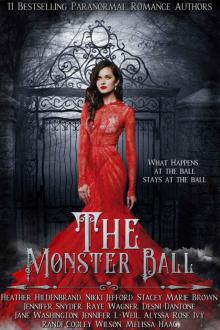 The Monster Ball: A Paranormal Romance Anthology
The Monster Ball: A Paranormal Romance Anthology The Girl Who Cried Werewolf
The Girl Who Cried Werewolf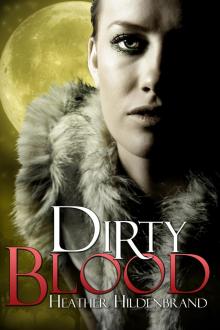 Dirty Blood
Dirty Blood Goddess Ascending
Goddess Ascending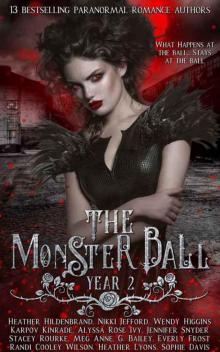 The Monster Ball Year 2
The Monster Ball Year 2 Kiss of Death (Supernatural Security Force Book 1)
Kiss of Death (Supernatural Security Force Book 1) Knock Em Dead (Supernatural Security Force Book 2)
Knock Em Dead (Supernatural Security Force Book 2) Bitter Rivalry (Bitterroot Series Book 1)
Bitter Rivalry (Bitterroot Series Book 1) Broken Blood
Broken Blood Blood Rule (Book 4, Dirty Blood series)
Blood Rule (Book 4, Dirty Blood series) Cold Blood
Cold Blood Death's Door (Supernatural Security Force Book 3)
Death's Door (Supernatural Security Force Book 3) Bitter Truth (Bitterroot Series Book 3)
Bitter Truth (Bitterroot Series Book 3) Guarded By The Alpha
Guarded By The Alpha Bitterroot, Part 2
Bitterroot, Part 2 The Girl Who Called The Stars (The Starlight Duology Book 1)
The Girl Who Called The Stars (The Starlight Duology Book 1) Esperance: (New Adult Paranormal Romance) (Heart Lines Series Book 3)
Esperance: (New Adult Paranormal Romance) (Heart Lines Series Book 3) Bitter Truth
Bitter Truth Tragic Ink: (A Havenwood Falls Novella)
Tragic Ink: (A Havenwood Falls Novella) Inheritance: (A New Adult Paranormal Romance) (Heart Lines Series Book 2)
Inheritance: (A New Adult Paranormal Romance) (Heart Lines Series Book 2)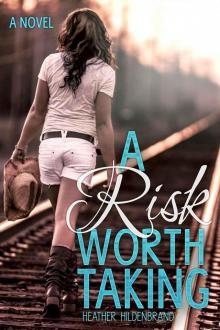 A Risk Worth Taking
A Risk Worth Taking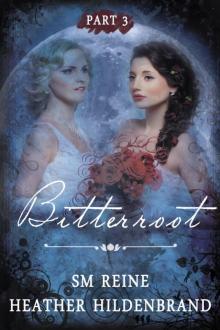 Bitterroot Part 3
Bitterroot Part 3 Bitterroot Part 1
Bitterroot Part 1 Remembrance: (New Adult Paranormal Romance) (Heart Lines Series Book 1)
Remembrance: (New Adult Paranormal Romance) (Heart Lines Series Book 1) Tragic Ink
Tragic Ink The Girl Who Wasn't
The Girl Who Wasn't Blood Bond
Blood Bond Deviation
Deviation The Girl Who Called The Stars
The Girl Who Called The Stars Bitter Rivalry
Bitter Rivalry Imitation
Imitation Defiance (Heart Lines Series Book 5)
Defiance (Heart Lines Series Book 5) A Bet Worth Making (Grayson County #2)
A Bet Worth Making (Grayson County #2)